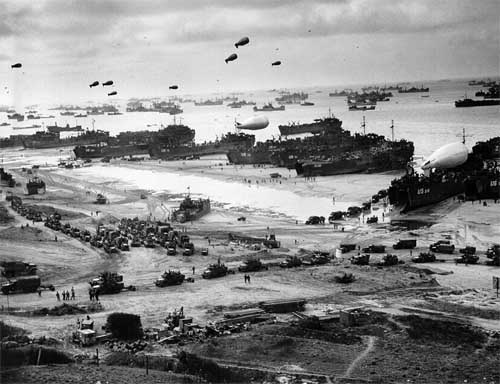June 6 1944: D-Day

On June 6 1944 one of the most ambitious attack plans in history took place. The story began seventy-four years earlier when Britain and her Allies were pushed off the Western side of the continent after Nazi Germany swept through The Netherlands, Belgium and France in a matter of weeks.
For the next four years Britain made its plans for the re invasion of Europe. Whilst the Second World War raged on across the globe military planners, intelligence gathers, deception experts and resistance groups (supported by SoE's) worked together to formulate a battle plan that could change the course of the war. To get it right was everything, to get it wrong would be a disaster.
Preparations for the attack included the invention of new technologies needed for an amphibious attack and an attack site without an obvious sea harbour that could sustain the supply requirements of the Allied armies (Mulbery harbour). It required months of careful deception planning to ensure that the Germans wouldn't know where the attack would come or when. And it would need hundreds of thousands of men and women to fight, fly, sail, supply and support in the attack that would last into weeks.
The plans were set for June 5 1944. For two months the whole of the UK was in lock down in preparation. Then on June 4 a huge storm rolled in across the Channel and the attack was delayed. This was a potential disaster as the timings were related to the conditions of the tides not just military plans and a delay of more than twenty-four hours would push the attack back by two weeks. Fortunately there was a break in the storm and the order of attack was given. The first wave of attack arrived in Normandy in the early hours of the 6th as paratroopers landed across strategic sites. At dawn on the 6th the armies of Britain, the United States and Canada led the assault on the beaches of Normandy code named Sword, Gold, Omaha, Utah and Juno supported by troops from the European Free Forces.
Despite Normandy not being the obvious point of attack on the French coast it still had extensive defences and the German troops in the area fought back against the attack. By midday on the 6th most of the beaches had been taken but fighting continued well into the evening.
By evening the attack and the first day was successful Key to the success of the day was the fact that the Germans didn't believe the attack was the real invasion and held some of their troops back. However, that belief would not last long and the Germans would try everything to keep control of Europe whilst for the Allies now came to hardest part of the battle - the battle to liberate the whole of Normandy and push the Nazis back to Germany.
On June 6 seventy years later we can reflect on that incredible day when Europe moved towards freedom from Nazism and commemorate those that contributed to that fight, especially those that were to never return.

